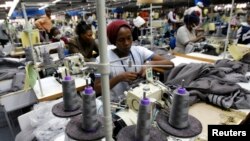Africa's textile and apparel exports to the United States could quadruple to $4 billion over the next decade through an extended duty-free trade treaty, a U.S. official said Wednesday.
The trade program known as the African Growth and Opportunities Act (AGOA), currently before American lawmakers, provides eligible sub-Saharan countries duty-free access to the world's top apparel market, giving Africa a competitive edge over suppliers such as Bangladesh and Vietnam.
The U.S. administration has already called for Congress to renew the program well ahead of its expiration date of Sept. 30, 2015. The program, in which about 40 African countries are eligible to take part, could be extended another 10 years.
"Ten years is a game-changer," said Gail Strickler, assistant U.S. trade representative for textiles and apparel. "Africa should be able to quadruple its exports, literally without a lot of trouble, creating another 500,000 new jobs."
Established in 2000, AGOA has already been renewed past its original 2008 expiration date.
Last year, U.S. clothing imports from sub-Saharan countries reached $986 million, up nearly 6 percent from 2013, as countries such as Lesotho, Kenya, Ethiopia and Tanzania participated in the program.
Analysts said Africa had lower labor costs and abundant raw materials, such as top-quality cotton from Uganda, but congested ports, a poor road network, lack of skills and old technology were a hindrance.
"While the costs may be rising in Asia, they are still way more competitive than Africa, especially on productivity, quality and product range," said Joseph Nyagari, an official at the Nairobi-based African Cotton and Textile Industries Federation.
African officials and Asian firms with factories in Africa welcomed AGOA's extension, saying investment would follow.
Kelebone Leisanyane, chief executive of the Lesotho National Development Corporation, said the landlocked southern African nation, a top exporter under AGOA, plans two new fabric mills.
"I think for Lesotho, AGOA is critical and its renewal means the survival of many families, with around 35,000 workers in the apparel and textile industry," he told Reuters.
Taiwanese firm New Wide Garment, which has six factories in Kenya and one each in Lesotho and Ethiopia, also aims to expand.
"Now with a 10-year extension, it means most of the investors will jump into Africa. We intend expanding more in Africa," Heman Boodia, its Africa vice president, told Reuters.





